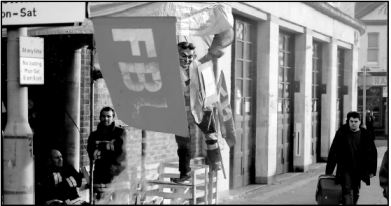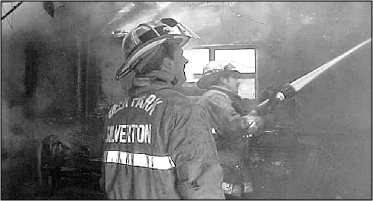|
|  |
 |

by MARTIN KRATZ
Anyone up before nine o'clock
on Wednesday the 29th
January will have seen the
first of many snowstorms that
would mark the day. Unless they
had any extremely pressing business
to take care of in the Preston
Circus area, however, they will not
have seen the firefighters dismantle
their picket line. I myself was quite
glad to have avoided the worst of
the weather too, by paying the
strikers a visit the night before.
The eight-day strike last year
received intense media coverage.
Recently, however, with news of an
increasing possibility of war, the firefighters'
strike has been neglected by
the British press. My explanation that
had not come to do an overtly political
article was well met by those gathered
around the obligatory brazier. As
found out later, the fact that I was
attempting to write with a local angle
in mind stood in my favor. The strikers
have become wary of earlier portrayals
of their actions, and feel that the press
had it in for them at first. This
explained why the fireman I interviewed
wanted to stay anonymous.
 The decision to strike seems to
have been made unanimously at the
station. 'We're all union members, we
all had a vote, and we voted to go out
and strike.' It was similarly supported
by the rest of the county stations,
including Hove, Eastbourne and
Hastings. The picket line is manned
according to the firefighters’ normal
weekly rota. Due to coincidence, Red
Watch covered both nights (6pm until
9am) of the 48-hour strike. They are
not alone, however, and are continually
talking to various members of the
public and firefighters who have come
in off-shift.
The decision to strike seems to
have been made unanimously at the
station. 'We're all union members, we
all had a vote, and we voted to go out
and strike.' It was similarly supported
by the rest of the county stations,
including Hove, Eastbourne and
Hastings. The picket line is manned
according to the firefighters’ normal
weekly rota. Due to coincidence, Red
Watch covered both nights (6pm until
9am) of the 48-hour strike. They are
not alone, however, and are continually
talking to various members of the
public and firefighters who have come
in off-shift.
To avoid the incessant noise of
people honking in support interrupting
my recording, I was led inside. 'Inside'
proved to be the fire escape. During
the strike, the employees aren't
allowed in the station, but are granted
a small, basic area which is used to
make tea and store food. There was
also a small sofa and a television on
which no one was watching David
Attenborough talk about monkeys. We
sat down by a window, where I was
brought a welcome cup of tea. All the
while David gently mumbled to himself
in the background, regularly drowned
out by the muffled sounds of passersby.
Red Watch passes most of its time
on the picket line with card games,
chatting about the strike and trying to
keep warm. The firewood has been left
by members of the public. Timber
yards have left their telephone numbers,
and bring in more fuel for the fire
whenever it is needed. Apparently
there is enough firewood to last them
a year.
The fact that press attention has
waned because of the war is understandable.
My source felt that it was
important to make clear, however, that
the firefighters’ dispute was initiated
early summer last year. Thus any blame
the firefighters are given for taxing the
military at this time is received with
frustration. The firefighters feel that
their opinion is being subtly undermined
in this way. The fact that the
government is able to get its point
across more strongly than the FBU has
created the impression that the media
is increasingly buckling under New
Labour spin.
The use of the word 'modernisation'
was suggested as evidence for
this. The seven years my source has
been employed at the station have witnessed
huge steps in modernisation.
The equipment we've got is so much
more sophisticated now. We are modernising.
The government wants to
carry out job cuts, potential station closures,
and the changing of shifts. They
should call it restructuring. It's going to
be catastrophic for the entire British
Fire Service.'
The apparently huge, negative
reaction to the strike as reported by
the press is also criticized. Even polls
which claim support to have risen to
53%, like the Guardian's in November,
appear overly moderate. The everyday
reality of the picket line would certainly
beg to differ. 'The polls are really not
a good reflection of real life. We get a
lot of support.' The public’s encouragement
does not end with stoking
the fire, the blaring of car horns, a
thumbs-up and a wave. These gestures
of encouragement are greatly appreciated.
But there is further, more concrete
evidence of community support.
Inside next to the sofa, the wall is
plastered with e-mails and letters of
support from unions and individual
members of the public in Brighton,
and one all the way from Canada. The
bucket for the FBU hardship fund is
always at hand. There have been some
generous donations for those who
have come in to difficulty because of
the strike, be it because they are
unable to pay off their mortgages, or
because they have sustained injuries
during a call out. Collections have also
been made and dropped off by other
unions in the area. 'We also have different
trade unions that appeared,
who have had collections at work and
have brought in a bucket of money. Or
for example the post workers' union
came in a van with boxes of coffee...It’s
been a huge response really.' Food has
proven to be one of the main ways in
which support has manifested itself.
Everything from biscuits and chocolate
to hot food are donated by the public,
including that night's menu of
Ratatouille and baked potatoes.
It surprised me to find that the firefighters
take some of these donations
to the army barracks up on Dyke Road.
This demonstrates that local relations
between firefighters and the military
are relaxed. My source regrets that the
military are always called in to clear up
someone else's mess, and there
appears to be no resentment between
the two parties. 'The army have, on
numerous occasions, passed the station
going to calls. They've acknowledged
us, and we've acknowledged
them. So there's no problem at all.'
 There is the question of whether
community support is being reciprocated
by the Fire Service. The fact that
Red Watch would answer a call out in
extreme circumstances argues yes it is.
In the case that someone is trapped in
blaze or a vehicle in a Road Traffic
Accident, Red Watch would proceed.
They will call us on a mobile phone
from joint control to give us the
address. We will then proceed in
pump to the emergency.' When the
firefighters are on strike this kind of
call out goes unpaid and potentially
uninsured. But then the members of
Preston Circus Fire station are in the
job because they care about it. They
are also glad for the way this sort of
occasion combats negative press
attention. 'It's good in the way the
public sees that if its a life threat we'll
go. I wouldn't have thought there's
single firefighter in the country, who
wouldn't go out to someone in distress.
That's what we are here for. We
do care about our job.'
There is the question of whether
community support is being reciprocated
by the Fire Service. The fact that
Red Watch would answer a call out in
extreme circumstances argues yes it is.
In the case that someone is trapped in
blaze or a vehicle in a Road Traffic
Accident, Red Watch would proceed.
They will call us on a mobile phone
from joint control to give us the
address. We will then proceed in
pump to the emergency.' When the
firefighters are on strike this kind of
call out goes unpaid and potentially
uninsured. But then the members of
Preston Circus Fire station are in the
job because they care about it. They
are also glad for the way this sort of
occasion combats negative press
attention. 'It's good in the way the
public sees that if its a life threat we'll
go. I wouldn't have thought there's
single firefighter in the country, who
wouldn't go out to someone in distress.
That's what we are here for. We
do care about our job.'
The maximum time anyone can
spend in the fire service is thirty years.
This means that there are fewer and
fewer employees who took part in the
last strike of 1977-8. There are, however,
one or two on each watch. The
last strike insured a pay formula that
up until ten years ago was excellent.
They consider this strike as just a cause
as the last strike, although there are
some differences. 'It's not just to do
with pay now, it's also to do with conditions
of service. We're talking about
the entire Service changing drastically.
That's what we're not happy with.'
It must be emphasized that none
of the firefighters want to be on strike.
Contrary to the representation of public
opinion, the encouragement shown
by the community to the strikers has
been immense, going a long way to
help those in the Fire Service endure
adversity.
The most lasting aspect of the
strike must be the reciprocal relationship
between the firefighters and the
community. And if anything the strike
has shown that neither party’s trust has
been misplaced.

|
|
